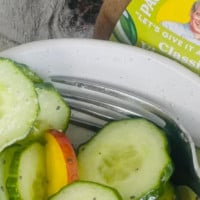“Yuck, I don’t like it!”… the catch phrase of a fussy eater
But given that 94.4% of Australian adults are not consuming the recommended amount of fruit and vegetables each day, I have a sneaking suspicion that it is not only children who push their plate away at the sight of Brussel sprouts.
Parents Need To Be Role Models
Parents are significant role models in the development of children’s eating habits as well as largely responsible for the foods purchased, prepared and provided to children. Given this, it is particularly concerning that 22% of parents are self-confessed ‘fussy eaters,’ and it seems no coincidence that 78% of children 4-8 years and 95% of teenagers 14 -16 years, similarly to their parents, fail to consume the recommended amount of vegetables each day.
Of course, there are many factors which influence eating behaviours and some degree of “fussiness” in young children is normal and to be expected.
Fussiness Starts Early
From around 12 months of age, as a child begins to assert their independence, playtime takes priority and food refusal, preferences, pickiness, and general uncooperativeness at meal times, is a common problem. On occasions, feeding difficulties and fussy eating behaviours are underpinned by medical or developmental issues, in which case professional intervention should be sought. Under normal circumstances, however, parents who are fussy eaters create the perfect environment to promote ‘fussiness’ and typically provide a diet with limited variety and limited opportunities for children to explore new and different foods.
Enjoying a wide variety of foods every day is important as it ensures a broad scope of nutrients within the diet which are essential for good health, growth and development. Regular and sufficient consumption of fruits and vegetables is extremely important, with 2% of all deaths in 2003 directly attributed to insufficient fruit and vegetable intakes.
Managing fussy eating
It is going to come as no surprise that my first and foremost strategy to assist children overcome ‘fussiness’ is to role model positive, healthy eating behaviours –
Eat and enjoy (or at least pretend to) foods from each of the five food groups (grains and cereals; fruit; vegetables; milks, cheese, yoghurts and alternatives; meats, nuts, eggs, and legumes), every day.
Be excited and enthusiastic to try new foods and different recipes.
Try setting yourself a goal to trying one new fruit or vegetable a week and allow children to be involved in choosing which ones to try.
Remember to buy in season (these will be the cheapest) and always choose Australian grown where possible.
Encouraging children to be involved in preparing foods, not only introduces important lifelong skills, but also allows children to become familiar with the texture and smells of new and different foods before they are expected to eat them.
From about 2 years of age children can be involved in a variety of age-appropriate cooking activities which can assist overcome fussy eating behaviours whilst also being a lot of fun. It is important to have age appropriate expectation of your child (as detailed in My Kitchen Milestones) and be prepared for a messy. If spending the afternoon cleaning the kitchen isn’t your idea of fun, try taking your cooking activity outside.
If you’re stuck for ideas of what to make with your budding little chefs, head over to The Kids Menu and download the free e-book ‘14 Healthy Kids Recipes’ which contains simple, fun recipes to engage children in the joy of cooking and healthy eating – it might even inspire a few fussy parents too.























2:04 pm
4:10 pm
9:13 am
8:52 pm
7:17 pm
2:38 pm
9:28 am
4:47 pm
5:36 pm
4:19 pm
2:42 am
12:07 am
5:56 pm
12:03 am
12:16 am
1:20 am
8:31 pm
10:33 am
6:25 pm
11:31 am
- 1
- 2
- …
- 9
- »
Post a commentTo post a review/comment please join us or login so we can allocate your points.